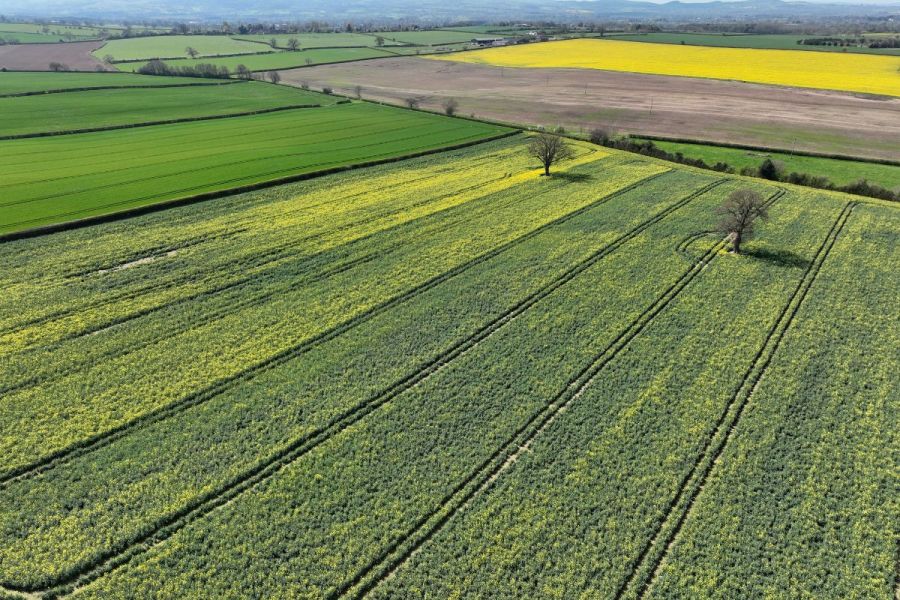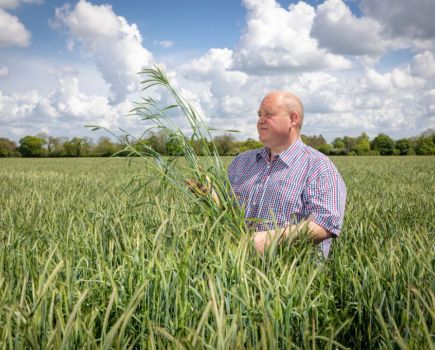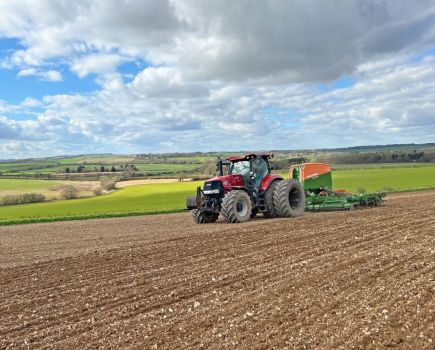Engaging in oilseed rape trials is giving Shropshire farmer, Rob Morgan, risk-free insight into how upcoming varieties could work on his farm. CPM finds out more.
“We’ve kept it simple because OSR has always been good to us, providing we can see through the challenges.”
By Janine Adamson
Taking a leap of faith away from a tried and tested variety takes guts, especially when faced with a challenge such as clubroot. But when it’s laid out in front of you to see with your own eyes, the evidence could prove hard to deny.
This is certainly the case for Rob Morgan, a staunch advocate of DSV’s Crocodile CR. With the 100ha farm having a significant clubroot problem, he admits it’ll take something special for him to change variety. However, taking part in Bayer’s Dekalb on-farm strip trials is giving bespoke, early doors insight into the options he has available in readiness for making a switch.
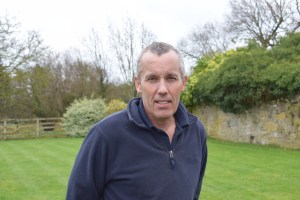
Taking part in on-farm trials is giving Rob Morgan the chance to compare new varieties with his go-to, Crocodile CR.
“Currently, we see no other break crop competing with oilseed rape in terms of margin. We tried lupins many years ago but it was a complete disaster. We also looked at grain maize but, again, it doesn’t seem viable in our scenario,” says Rob.
“Yes, we operate a classic rotation of first wheat, second wheat, OSR, which is quite tight. But we’ve kept it simple because OSR has always been good to us, providing we can see through the challenges.”
The main challenge being clubroot, which if left untreated can knock the Shropshire farm’s OSR yields in half. As a result, Rob’s restricted to clubroot-resistant varieties, with Crocodile being his go-to for achieving success. However, taking part in the Dekalb trials has broadened his horizons.
“It’s very useful being one of the first to try new varieties, even when we have to face such pressure from clubroot. What I’m interested in seeing is early vigour, and the crop’s ability to get up and away from potential pest damage. Then, how the crop kicks back into action in the spring.
“The benefit of taking part in trials is I can see all of this on my own farm, plus give back to the wider industry. That’s really important to me, I want to contribute to the bigger picture,” says Rob.
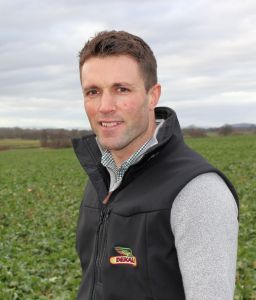
Richard Williams says Rob Morgan gets good results because he’s attentive and takes time to consider the detail.
He first became involved with Bayer around five years ago and is now a valued contributor to the company’s geographical data, as part of the firm’s group of forward-thinking farmers. It was his desire to ‘do things right’ that caught Richard Williams’ eye – viewed as the main reason behind the strong partnership.
Richard, Bayer’s Dekalb technical specialist, believes Rob’s 4.5t/ha OSR yields speak for themselves. “Rob gets good results because he’s attentive and takes time to consider the detail. He thinks and acts like a professional triallist, which is precisely the type of grower we want for our on-farm strip trials.
“We recognise clubroot is a serious threat for the farm, so have included an up-and-coming clubroot-resistant variety in the trial to compare with Crocodile. This is valuable early doors access for Rob, and a low-risk chance for him to try it out,” says Richard.
“We don’t expect him to change overnight, but it might raise a few questions once the variety comes to the market.”
The variety in question is DK Pledge CR, which is in its first year of testing. Although yield output and oil content are to be confirmed, Richard believes it could be a game-changer.
“Pledge is a stiff stemmed variety with favourable traits such as resistance to lodging and pod shatter. It also has a solid disease resistance package including phoma stem canker and light leaf spot. Of all the varieties we’re trialling at Rob’s this year, this is the one for him to keep an eye on.”
Beyond Pledge, the majority of the varieties in the strip trial are from the existing Dekalb hybrid portfolio, including V367OL – viewed as the ‘next step’ in HOLL OSR. The variety is marketed as offering higher yields than existing products, along with pod shatter resistance. Its medium autumn growth habit makes it suitable for early drilling as well as at the standard timing.
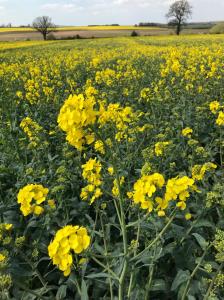
DK Pledge CR is a new stiff stemmed oilseed rape variety currently on trial at Rob Morgan’s farm in Shropshire.
But for something different, new candidate variety DMH470 has also been included in the trial at Rob’s farm. This offers turnip yellows virus (TuYV) resistance, pod shatter resistance and the Rlm7 gene for stem canker protection.
To help oversee management of the plots, Rob has support from his agronomist brother Dai, who encouraged him to be involved with Bayer in the first place. “I guess we both have enquiring minds and are open to sharing our knowledge with others. As well as the Dekalb trials, we’re involved with work for Frontier and Eurofins. We host farmer tours and do our best to stay up to date,” says Rob.
In 2014, Rob, who also has a contracting business, was given the opportunity to buy the farm following generations of tenancy. However, land suitable for environmental stewardship wasn’t included so he had to seek alternative ways to address the sustainability agenda.
So far, priorities have included installing solar panels on farm buildings and enabling rainwater harvesting. Given the farm’s location in Acton Burnell near Shrewsbury, where rain is plentiful, Rob viewed this as a quick win.
He’s also taking steps towards improving the farms’ soils, something that was neglected when the farm first switched from a mixed farm to pure arable in 2000. “We lacked the animal waste that we had back when we operated as a mixed system, so needed to find new ways to put back into the soil.
“To do so, we’re experimenting with cover crop varieties to break up compaction and encourage soil biology. Nutrition is applied using variable rate maps to ensure we feed the soil whilst minimising wastage. Also, biostimulants are a part of our spray programme, including a trial of Vacciplant (laminarin) as a fungicide for septoria control in wheat,” says Rob.
Of course, no OSR commentary would be complete without reference to cabbage stem flea beetle. The farm indeed has a problem with the pest, with Rob choosing to spray at night when the beetle is most active. That said, he’s hoping to improve his understanding through monitoring in a bid to align with his sustainability goals.
An upcoming solution from Bayer which could be the answer is MagicTrap. This digital yellow trap enables farmers to detect and assess pest activity in OSR crops and is due for launch next year.
Insects, including CSFB, pollen beetle and weevil species, fly into the traps, lured by the yellow colour which resembles OSR flowers. The inside of the trap is then photographed at regular intervals, sending the high-resolution imagery via mobile radio. Images are then automatically evaluated, with results made available to farmers in the MagicScout smartphone app.
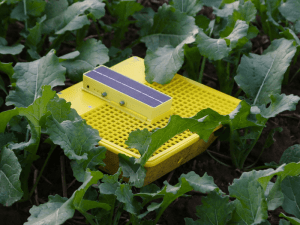
MagicTrap is a new pest monitoring solution that enables farmers to detect and assess cabbage stem flea beetle in oilseed rape crops.
Although standard yellow water traps have been around for years, MagicTrap is a new self-sufficient solution that minimises time investment from the grower. The system has been available in Germany and Austria for two years, where it’s been swiftly adopted by growers. Having seen the results, Rob hopes to be one of the first to give it a try.
To help him understand the benefits, he’ll be able to gain insight from Mike Wilton of the Stody Estate in Norfolk, who’s been trialling the system for Bayer UK. Mike has around 260ha of winter OSR and although CSFB pressure has been lower than previous years, he says he likes its potential.
He’ll see the trial through for the rest of the season but’s keen to see where else MagicTrap could be potentially used, one of his suggestions being monitoring peach-potato aphid in sugar beet crops.
For now, CSFB appears to be an obvious gain for the UK market. According to Bayer’s Max Dafforn, providing near instantaneous updates on the pest helps growers to use pesticides more appropriately. “MagicTrap is the latest in digital decision support systems helping the grower to monitor pests as they near the threshold level for action.
“Having an evidence trail of this type ensures the use of plant protection products is timely and proportionate,” he says. Max also notes that because farmers don’t have to regularly inspect the traps, as per standard yellow water traps, this saves time and is one less thing to think about.
With the Stody Estate understanding a sustainability-led system is the future, Mike and the team were the ideal candidates for the MagicTrap trial. Monitoring forms the basis of the farm’s all-round integrated approach to pest management, followed by optimised cultivation and ensuring crops ‘get going’ as fast as possible.
For OSR management, Mike selects hybrid varieties and champions the importance of making sure there’s enough soil moisture. “We always look to get a good seedbed but wait until there’s sufficient moisture, which can take two or three rain events. If necessary, we’ll delay drilling because we believe moisture is more critical than drilling date,” he says.
“We also include some starter fertiliser and roll fields soon after drilling to encourage good seed-to-soil contact. If you have sufficient soil moisture, the crop can come up in four to five days and establish evenly. This results in the required low plant populations of around 25 plants/m2,” he concludes.
Forward-thinking farmers
With robotics, gene mapping and molecular markers, digital technology and bio-chemistry, it is a dynamic time for anyone involved in agriculture.
Challenges lie ahead for UK agriculture, such as improving productivity while minimising its environmental footprint. But farmers have always had to deal with change and adopt new ideas and technology.
Bayer is at the core of these agricultural advances, working with farmers throughout the UK and further afield to trial and develop new diagnostic tools and evaluate different farming strategies, coupled with exciting plant breeding and product development programmes. It will help us develop innovative solutions and services to assist farmers achieve profitable and sustainable agronomic practices.
Despite the challenges facing UK agriculture there is much to look forward to. This series of articles focuses on how innovation and partnership between farmer and industry will help us face the future together.
This article was taken from the latest issue of CPM. Read the article in full here.
For more articles like this, subscribe here.
Sign up for Crop Production Magazine’s FREE e-newsletter here.

